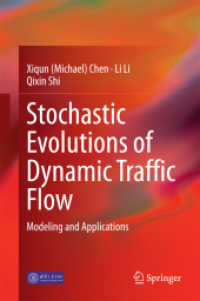- ホーム
- > 洋書
- > 英文書
- > Literary Criticism
Full Description
This volume offers a new account of the relationship between literary and secularist scenes of writing in interwar Britain. Organized secularism has sometimes been seen as a phenomenon that lived and died with the nineteenth century. But associations such as the National Secular Society and the Rationalist Press Association survived into the twentieth and found new purpose in the promotion and publishing of serious literature. This book assembles a group of literary figures whose work was recommended as being of particular interest to the unbelieving readership targeted by these organisations. Some, including Vernon Lee, H.G. Wells, Naomi Mitchison, and K.S. Bhat, were members or friends of the R.P.A.; others, such as Mary Butts, were sceptical but nonetheless registered its importance in their work; a third group, including D.H. Lawrence and George Moore, wrote in ways seen as sympathetic to the Rationalist cause. All of these writers produced fiction that was experimental in form and, though few of them could be described as modernist, they shared with modernist writers a will to innovate.
This book explores how Rationalist ideas were adapted and transformed by these experiments, focusing in particular on the modifications required to accommodate the strong mode of unbelief associated with British secularism to the notional mode of belief usually solicited by fiction. Whereas modernism is often understood as the literature for a secular age, Unbelief in Interwar Literary Culture looks elsewhere to find a literature that draws more directly on secularism for its aesthetics and its ethics.
Contents
Introduction
1: The Ethics of Unbelief in Vernon Lee and William James
2: H.G. Wells's 'Theological Excursion' and the Dialogue Novel
3: The 'Death of God' in New Testament Biofiction
4: Mary Butts and 'Belief in Belief' in Traps for Unbelievers, and Supernatural Stories
5: Naomi Mitchison's Rationalist Heresy and Speculative Humanism in Beyond this Limit
6: K.S. Bhat, Soma, and a Transnational Literature of Unbelief
Conclusion: Literary Unbelief from 1945 to the Present





